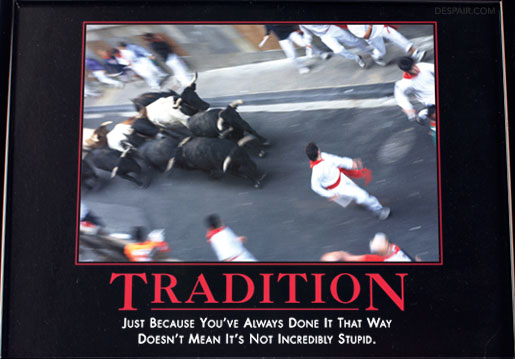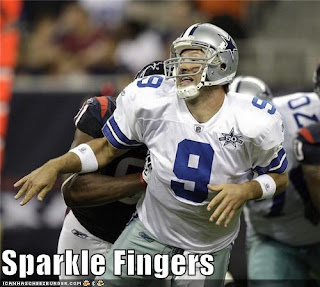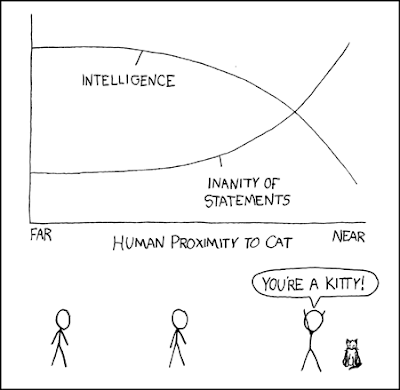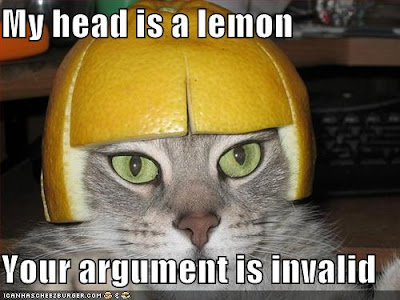(There will be some points off if your absence on Tuesday was unexcused.)

PHIL 09110-01 & -04
Rowan University
Spring 2012

 We talked about this on Tuesday: Scientific American has a nice article examining the widely-held belief that the full moon causes strange behavior. Research suggests the full moon doesn't have this effect:
We talked about this on Tuesday: Scientific American has a nice article examining the widely-held belief that the full moon causes strange behavior. Research suggests the full moon doesn't have this effect:"By combining the results of multiple studies and treating them as though they were one huge study—a statistical procedure called meta-analysis—[scientists] have found that full moons are entirely unrelated to a host of events, including crimes, suicides, psychiatric problems and crisis center calls. In their 1985 review of 37 studies entitled 'Much Ado about the Full Moon,' which appeared in one of psychology’s premier journals, Psychological Bulletin, Rotton and Kelly humorously bid adieu to the full-moon effect and concluded that further research on it was unnecessary."One reason the belief persists is a set of natural human cognitive biases in which we perceive correlations where no such correlations exist:
"Illusory correlations result in part from our mind’s propensity to attend to—and recall—most events better than nonevents. When there is a full moon and something decidedly odd happens, we usually notice it, tell others about it and remember it. We do so because such co-occurrences fit with our preconceptions. ... In contrast, when there is a full moon and nothing odd happens, this nonevent quickly fades from our memory. As a result of our selective recall, we erroneously perceive an association between full moons and myriad bizarre events."We'll be discussing these biases more when we study arguments about causes. Here's a cool video by psychological Dan Gilbert on our mistaken expectations:



P1- true
P2- true
support- valid
overall- sound
P1- questionable ("annoying" is subjective)3) All males in this class are humans.
P2- true
support- valid (the premises establish that some email forwards are both annoying and false; so some annoying things [those forwards] are false)
overall- unsound (bad first premise)
P1- true4) No humans are amphibians.
P2- true
support- invalid (the premises only tell us that males and females both belong to the humans group; we don't know enough about the relationship between males and females from this)
overall- unsound (bad support)
P1- true5) All bats are mammals.
P2- true
support- valid (the premises say that frogs belong to a group that humans can't belong to, so it follows that no frogs are humans)
overall- sound
P1- true6) Some dads have beards.
P2- true (if interpreted to mean "All bats are the sorts of creatures who have wings.") or false (if interpreted to mean "Each and every living bat has wings," since some bats are born without wings)
support- invalid (we don't know anything about the relationship between mammals and winged creatures just from the fact that bats belong to each group)
overall- unsound (bad support)
P1- true7) Oprah Winfrey is a person.
P2- questionable ("mean" is subjective)
support- valid (if all the people with beards were mean, then the dads with beards would be mean, so some dads would be mean)
overall- unsound (bad 2nd premise)
P1- true8) All students in here are mammals.
P2- true (you might not have directly seen anyone eat tacos, but you have a lot of indirect evidence... with all the Taco Bells, Don Pablos, etc., surely lots of people ate tacos yesterday)
support- invalid (the 2nd premise only says some ate tacos; Oprah could be one of the people who didn't)
overall- unsound (bad support)
P1- true
P2- true
support- invalid (the premises only tell us that students and humans both belong to the mammals group; we don't know enough about the relationship between students and humans from this; for instance, what if a dog were a student in our class?)
overall- unsound (bad structure)
 9) All hornets are wasps.
9) All hornets are wasps.P1- true!10) If Sean sings, then students cringe.
P2- true
P3- questionable ("scary" is subjective)
support- valid (same structure as in argument #1, just with an extra premise)
overall- unsound (bad 3rd premise)
P1- questionable (since you haven't heard me sing, you don't know whether it's true or false)11) If Sean sings, then students cringe.
P2- false
support- valid
overall- unsound (bad premises)
P1- questionable (again, you don't know)12) All students in here are humans.
P2- true
support- invalid (from premise 1, we only know what happens when Sean is singing, not when he isn't singing; students could cringe for a different reason)
overall- unsound (bad 1st premise and structure)
P1- true13) (from Stephen Colbert)
P2- true!
support- invalid (the premises state a strong statistical generalization over a large population, and the conclusion claims that this generalization holds for a much smaller portion of that population; even though it's likely that most students in here are, in fact, shorter than 7 feet tall, it nevertheless could be true that the humans in here are a statistical anomaly)
overall- unsound (bad support)
P1- questionable ("great" is subjective)14) If Sean sings, then students cringe.
P2- questionable ("great" is subjective)
support- valid (it's either A or B; it's not A; so it's B)
overall- unsound (bad premises)
P1- questionable (again, you don't know)15) If Sean sings, then students cringe.
P2- false
support- invalid (from premise 1, we only know that Sean singing is one way to guarantee that students cringe; just because they're cringing doesn't mean Sean's the one who caused it; again, students could cringe for a different reason)
overall- unsound (bad premises and structure)
P1- questionable (again, you don't know)16) If there is no God, then life is meaningless.
P2- true
support- valid
overall- unsound (bad 1st premise)
P1- questionable (that's not an obvious claim to prove or disprove)
P2- questionable (again, that's not an obvious claim to prove or disprove)
support- valid (the same structure as argument #15)
overall- unsound (bad premises)
